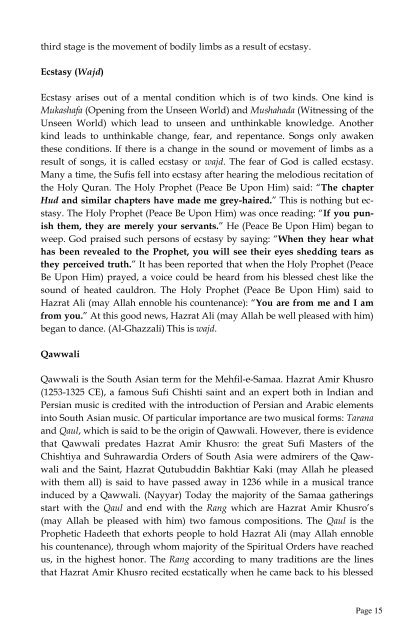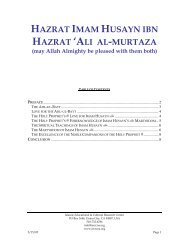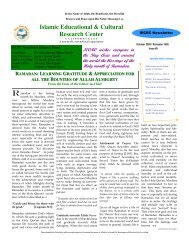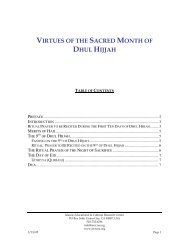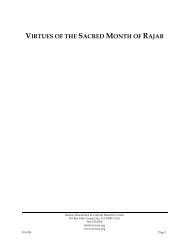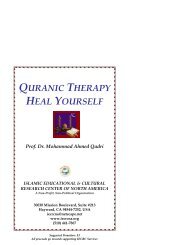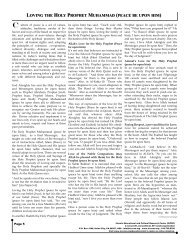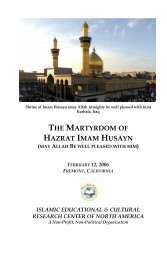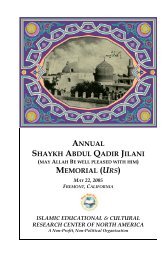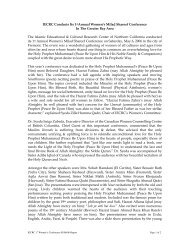Khwaja Ghareeb Nawaz rahmatullah alayh - IECRC
Khwaja Ghareeb Nawaz rahmatullah alayh - IECRC
Khwaja Ghareeb Nawaz rahmatullah alayh - IECRC
You also want an ePaper? Increase the reach of your titles
YUMPU automatically turns print PDFs into web optimized ePapers that Google loves.
third stage is the movement of bodily limbs as a result of ecstasy.<br />
Ecstasy (Wajd)<br />
Ecstasy arises out of a mental condition which is of two kinds. One kind is<br />
Mukashafa (Opening from the Unseen World) and Mushahada (Witnessing of the<br />
Unseen World) which lead to unseen and unthinkable knowledge. Another<br />
kind leads to unthinkable change, fear, and repentance. Songs only awaken<br />
these conditions. If there is a change in the sound or movement of limbs as a<br />
result of songs, it is called ecstasy or wajd. The fear of God is called ecstasy.<br />
Many a time, the Sufis fell into ecstasy after hearing the melodious recitation of<br />
the Holy Quran. The Holy Prophet (Peace Be Upon Him) said: “The chapter<br />
Hud and similar chapters have made me grey-haired.” This is nothing but ecstasy.<br />
The Holy Prophet (Peace Be Upon Him) was once reading: “If you punish<br />
them, they are merely your servants.” He (Peace Be Upon Him) began to<br />
weep. God praised such persons of ecstasy by saying: “When they hear what<br />
has been revealed to the Prophet, you will see their eyes shedding tears as<br />
they perceived truth.” It has been reported that when the Holy Prophet (Peace<br />
Be Upon Him) prayed, a voice could be heard from his blessed chest like the<br />
sound of heated cauldron. The Holy Prophet (Peace Be Upon Him) said to<br />
Hazrat Ali (may Allah ennoble his countenance): “You are from me and I am<br />
from you.” At this good news, Hazrat Ali (may Allah be well pleased with him)<br />
began to dance. (Al-Ghazzali) This is wajd.<br />
Qawwali<br />
Qawwali is the South Asian term for the Mehfil-e-Samaa. Hazrat Amir Khusro<br />
(1253-1325 CE), a famous Sufi Chishti saint and an expert both in Indian and<br />
Persian music is credited with the introduction of Persian and Arabic elements<br />
into South Asian music. Of particular importance are two musical forms: Tarana<br />
and Qaul, which is said to be the origin of Qawwali. However, there is evidence<br />
that Qawwali predates Hazrat Amir Khusro: the great Sufi Masters of the<br />
Chishtiya and Suhrawardia Orders of South Asia were admirers of the Qawwali<br />
and the Saint, Hazrat Qutubuddin Bakhtiar Kaki (may Allah he pleased<br />
with them all) is said to have passed away in 1236 while in a musical trance<br />
induced by a Qawwali. (Nayyar) Today the majority of the Samaa gatherings<br />
start with the Qaul and end with the Rang which are Hazrat Amir Khusro’s<br />
(may Allah be pleased with him) two famous compositions. The Qaul is the<br />
Prophetic Hadeeth that exhorts people to hold Hazrat Ali (may Allah ennoble<br />
his countenance), through whom majority of the Spiritual Orders have reached<br />
us, in the highest honor. The Rang according to many traditions are the lines<br />
that Hazrat Amir Khusro recited ecstatically when he came back to his blessed<br />
Page 15


